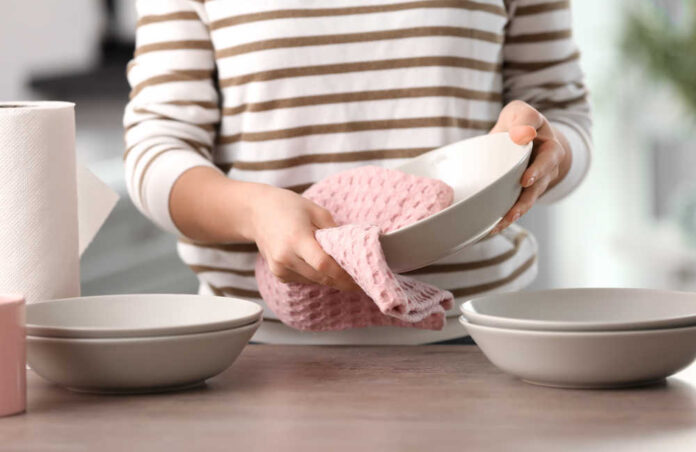
How often do you clean your kitchen towels?
You use them to wipe your hands, clean up spills, and maybe even dry your dishes.
If you’re not washing your towels regularly, they can harbor pathogenic bacteria and potentially lead to the spread of food poisoning infections.
A Breeding Ground For Bacteria
Bacteria thrive in warm, moist environments, which means that kitchen towels provide the perfect conditions for them to grow.
In a study examining the potential role of kitchen towels in cases of food poisoning, researchers noted the presence of bacteria such as:
- E. Coli
- Enterococcus spp.
- Pseudomonas spp.
- Bacillus spp.
- Staphylococcus aureus
These bacteria can cause gastrointestinal issues like diarrhea, vomiting, and cramping.
They can also lead to more severe infections, especially in young children, the elderly, or those with weakened immune systems.
Diet, Family Size, and Other Factors
Enterococcus spp. and S. aureus appear to be more commonly found in the kitchen towels of bigger families, possibly because there are more opportunities for them to spread.
Enterococcus spp. It may be more common in the towels of vegetarian households, while E. Coli and S. aureus were detected at a significantly higher rate in non-vegetarian, meat-eating households.
How you use the towels can also influence how much bacteria is present. Multi-use towels – those used for multiple purposes like wiping hands and cleaning surfaces – had more bacteria than those used for one purpose only.
Staying Safe in the Kitchen
Reduce the risk of food poisoning or other illness by keeping your kitchen towels clean.
Don’t let them be reused for weeks at a time. Wash them in hot water after every use, especially if they’ve had any contact with raw meat or hands or utensils that have touched raw meat.
Set out multiple towels designated for different purposes – one for drying dishes, one for wiping up spills, one for dirty hands, one for drying clean hands, etc.
If multiple people are cooking, preparing food, or using the kitchen, each person should have their own separate towel to minimize cross-contamination and spread.
Also, make sure to wash your hands frequently, especially after handling raw meat or other potentially contaminated items. Thoroughly clean all cooking surfaces, utensils, and dishes before and after preparing food to remove any bacteria that may be present.
Food poisoning is no fun for anyone, so take the necessary precautions to keep every part of your kitchen clean – including your towels.






















